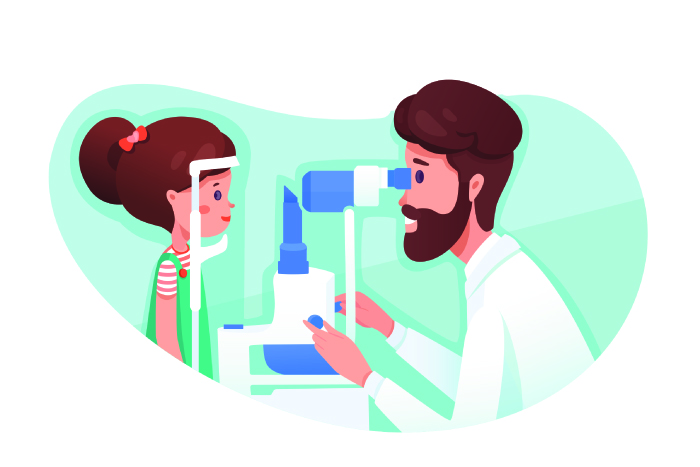Pediatric Vision Care Treatment in Kondapur, Hyderabad
Pediatric vision care, also known as pediatric ophthalmology, includes healthcare procedures that are important to check on your child’s vision. In comparison to adults, it is rather difficult for children to be able to express or explain any vision-related problems that they may be facing.
The main reason for providing eye examinations for young children is to identify those whose visual development is not following normal patterns. Such examinations also help identify children who might need spectacle correction, or who are at risk of developing vision-related conditions like amblyopia, strabismus, or other refractive errors.

Vision care exams are performed by three types of eye specialists:
These are medically qualified doctors who provide complete eye exams, prescribing corrective lenses, diagnosing and treating eye diseases, and performing eye surgery as well.
An optometrist can provide complete eye exams, prescribe corrective lenses, diagnose common eye disorders, and treat selected eye diseases. Optometrists do not perform surgery or work on complex eye-related issues.
- Ophthalmologist
- Optometrist
- Optician
An optician is an eye care provider who assembles, fits, sells, and fills prescriptions for eyeglasses.
What happens during an eye exam?
If your child needs an eye exam, the following tests can be a part of the procedure:
- Visual Acuity Test, or inspection of eye-sight
This is one of the primary tests involving a check on the sharpness of the child’s eye-sight. It is performed using an eye chart and asking the child to read numerous lines of characters. Each eye is tested separately.
- Overall inspection of the eye
This test involves examining the eyes, eyelids, various eye muscle movements, pupils, and the reflection of light from the back of the eye.
- Cover Test
This test examines how the child’s eyes work together and detects if there is a misalignment of the eyes. While the child is asked to focus on a target, the examiner covers each eye one at a time to look for a shift in the eyes.
- The Ocular Motility Testing, or eye movement test
This test helps determine how well the child’s eyes can follow a moving object, and how quickly as well as smoothly they can move between and accurately fixate on two separate objects. The examiner in these tests would ask your child to move his eyes slowly or quickly, back and forth between two objects.
What are the benefits of pediatric ophthalmic care?
Eye tests or eye exams are important and beneficial for maintaining your child’s ophthalmic health. These tests can help diagnose any underlying vision-related problems that occur commonly in children or are present due to family history with the condition.
A child’s performance can be affected in curricular as well as co-curricular activities that take place in school due to impaired vision. Any vision-related condition can hinder one's daily life as well. Hence, providing your child with the proper vision and eye care can help benefit their life in all aspects.
Early diagnosis of conditions related to the eyes or vision can help provide early and more successful treatment to the child before the problem turns into something more critical.
What are the signs that your child requires vision care?
Certain symptoms can help parents know that their child might be in urgent need of ophthalmic care or may be at risk of developing a vision-impairing condition, these include:
- Poor performance at school
- Difficulty in reading or writing
- Difficulty seeing things at a distance like information on the chalkboard
- Blurry vision
- Persistent pain in the eyes
- Persistent headache
- Trouble focussing
Request an appointment at Apollo Spectra Hospitals, Kondapur
Call 1860-500-2244 to book an appointment.
If you observe any of the prominent symptoms for a prolonged period, contact your healthcare provider for running the required tests and timely diagnosis.
One way to improve your child’s eyesight or decrease the risks of vision impairment is to maintain certain healthy diet habits like consuming fish, eggs, carrots, citrus fruits, etc.
If your child requires vision correction like glasses or contact lenses, the exams would be recommended more frequently than for a child who does not require their vision corrected, exams every one or two years are suggested for the latter.
A child should have their first eye exam at 6 months of age, then at age 3, and then at about age 5 or 6.
Symptoms
Our Top Specialities
NOTICE BOARD
CONTACT US
CONTACT US
 Book Appointment
Book Appointment


.svg)
.svg)
.svg)
.svg)








